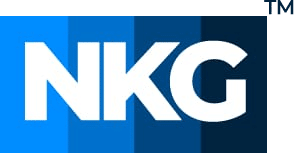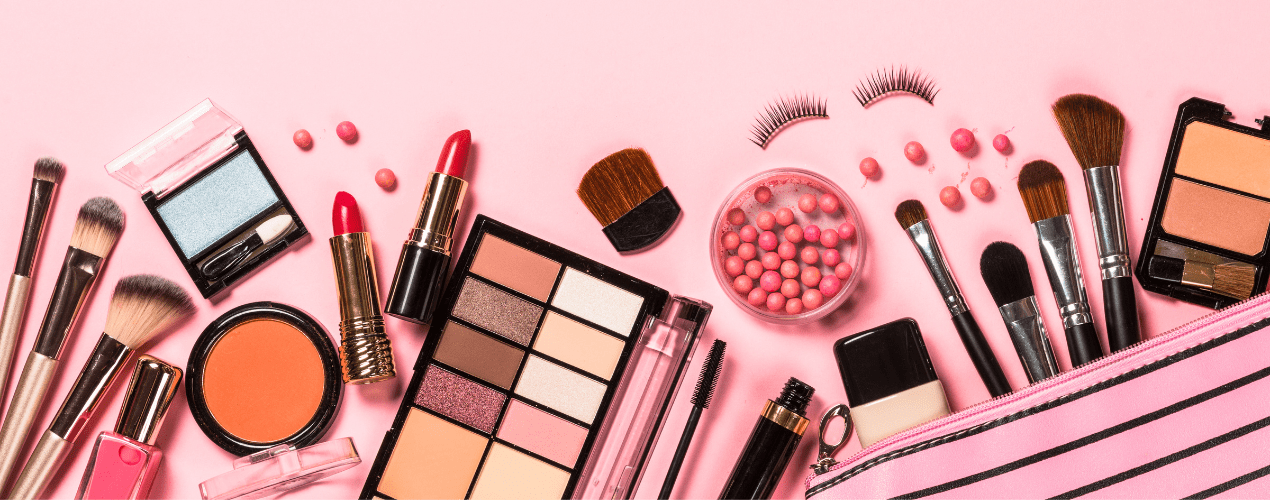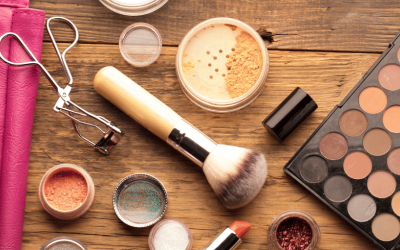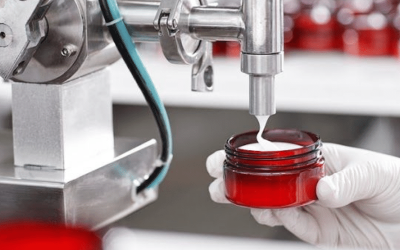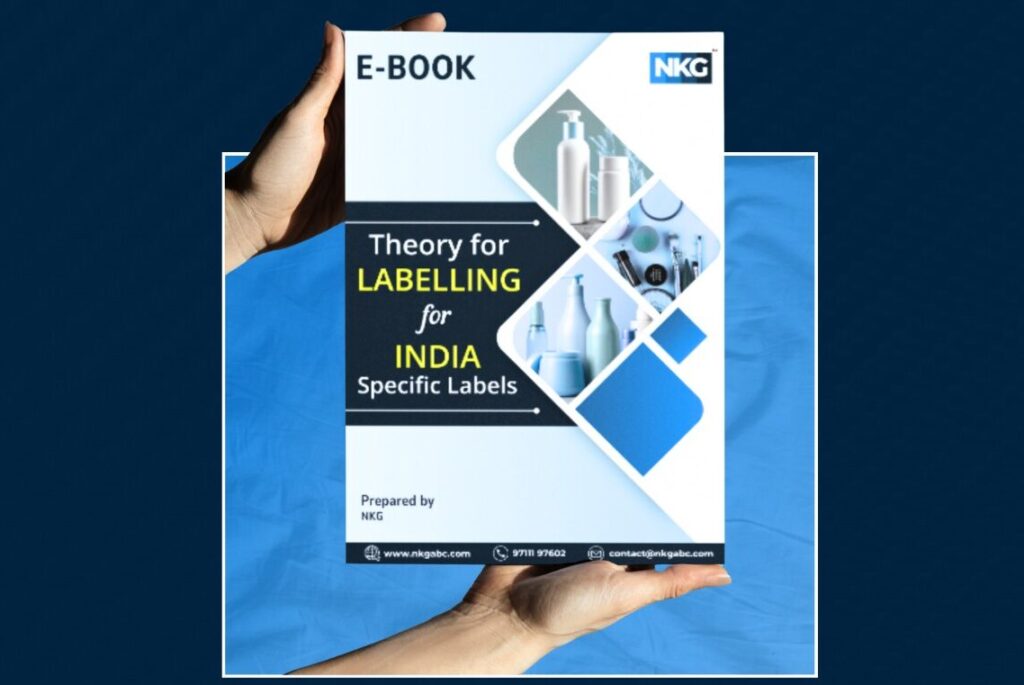The FDA’s regulations that oversight cosmetic products have undergone significant changes for the first time since 1938, bringing the nation’s cosmetic laws into line with contemporary demands. U.S. President Joe Biden On December 29, 2022, signed the bill into effect. New regulations for cosmetic products are added by the Modernization of Cosmetics Regulation Act of 2022 (MoCRA), which amends Chapter VI: Cosmetics of the Federal Food, Drug, and Cosmetic Act (FD&C Act).
The regulatory changes made by MoCRA impact different phases of the lifecycle of cosmetic products, leading to increased scrutiny and more onerous compliance requirements for cosmetic businesses. Most provisions come into force on December 29, 2023, one year after their enactment. To successfully navigate the changing landscape of cosmetic regulation in the United States during this period, cosmetics enterprises should become familiar with the new legislation and its key deadlines. They should also quickly get ready to take the necessary actions to comply with the latest regulatory requirements.
Good manufacturing practices (GMPs), serious adverse event reporting and recordkeeping, safety substantiation, facility registration and product listing requirements, and safety substantiation will apply to cosmetic companies under MoCRA. In addition, the MoCRA gives the U.S. Food & Drug Administration (FDA or Agency) the power to mandate the recall of a cosmetic product and suspend a facility’s registration if the FDA determines adverse severe health concerns.
In this blog, NKG discusses the main clauses of MOCRA:
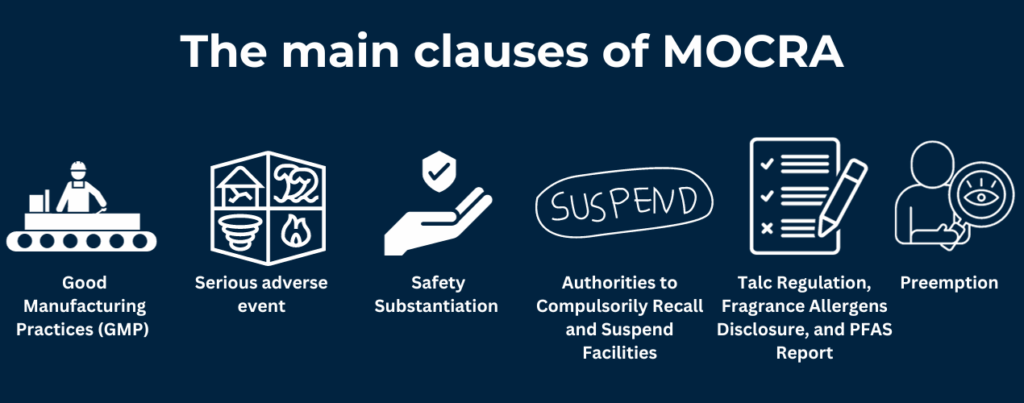
- Good Manufacturing Practices (GMP) – According to MoCRA, the FDA must publish GMP guidelines for facilities that manufacture and process cosmetics. The rules must be compliant with both domestic and foreign standards. Additionally, regulations must be created to safeguard the general public’s health and guarantee that cosmetics are not tampered with. The FDA may issue rules permitting the Agency to examine the records required to prove GMP compliance. The size and scope of the businesses involved in the production of cosmetics and the risks these cosmetics pose to the public’s health must be considered by the FDA when establishing GMP regulations. FDA must offer enough latitude to be workable for facilities of all sizes and types to which these regulations will apply. For smaller businesses, these regulations must also include streamlined GMP requirements, and they shouldn’t place an undue financial burden on them. After MoCRA is passed, the FDA must publish a proposed rule within two years and a final rule no later than three years later.
- Serious adverse event – Any “serious adverse event” connected to using a cosmetic product made, packed, or distributed by the responsible person in the United States must be reported within 15 business days of receiving it to the FDA. Any new and significant medical information pertaining to the initial report must also be submitted by the responsible party to FDA within 15 business days of receipt for one year following the initial submission. A “serious adverse event” is an unfavorable health-related occurrence connected to using a cosmetic product that causes death, a life-threatening situation, inpatient hospitalization, a persistent or significant disability or incapacity, a congenital anomaly or congenital disability, an infection, or significant disfigurement. The responsible party must provide a domestic address, domestic phone number, or electronic contact information on the cosmetic product label to receive adverse event reports. The accountable party must keep records for six years regarding each report of an adverse event connected to the domestic use of a cosmetic product they produced, packaged, or distributed. Some small businesses are only required to keep these records for three years.
- Safety Substantiation – A responsible person must ensure and keep records proving that the cosmetic product’s safety is adequately supported. According to experts qualified by scientific training and experience to assess the safety of cosmetic products and their ingredients, “adequate substantiation of safety” is defined as tests, studies, research, analyses, or other evidence or information that is thought to be sufficient to support a reasonable certainty that a cosmetic product is safe. According to MoCRA, a cosmetic product is “safe” if it does not harm users when used according to the instructions on the label or in other typical or customary ways. The law also states that a cosmetic ingredient or product is not harmful to users simply because some users may experience minor and temporary reactions or skin irritations. The FDA may consider cumulative or other pertinent exposure to the cosmetic product, including any ingredient when determining whether a product is safe.
- Authorities to Compulsorily Recall and Suspend Facilities – Suppose the Agency determines that there is a reasonable probability that the product is adulterated or misbranded. The use of or exposure to the product will result in serious adverse health consequences or death. In that case, FDA gets authority from MoCRA to request a voluntary recall of a cosmetic product. After providing the responsible party a chance for an informal hearing, FDA may order a mandatory recall if the responsible party refuses to comply with its request. The FDA must see that any recalls issued under this clause result in the publication of a press release about the recall and the availability of an image of the cosmetic product that is the subject of the press release on the FDA website. Suppose the FDA determines that a cosmetic product produced by a particular facility has a plausible chance of having severe unfavorable health effects and thinks other products may be similarly impacted. In that case, the FDA is also empowered to suspend the facility’s registration. If the FDA revokes a facility’s registration, the facility is allowed to release cosmetic products once the FDA reinstates the registration commercially. FDA must give notice and an opportunity for an informal hearing to the facility registrant before suspending the facility registration.
- Talc Regulation, Fragrance Allergens Disclosure, and PFAS Report – The FDA must issue regulations to identify fragrance allergens that must be disclosed on a cosmetic product’s label. The European Union’s substance and format for these requirements are among the requirements that the FDA must consider when establishing these regulations. Additionally, Congress has permitted the FDA to set thresholds for the amounts of substances that must be disclosed. Within 18 months of MoCRA’s passage, the FDA must publish a proposed rule, and by 180 days after the public comment period for the proposed rule has ended, it must publish a final rule. The MoCRA also instructs FDA to issue regulations that establish and mandate standardized testing procedures for finding and identifying asbestos in cosmetic products that contain talc. Within a year of MoCRA’s passage, the FDA must issue a proposed rule, and no later than the end of the proposed rule’s public comment period, it must issue a final rule. Additionally, the MoCRA mandates that the FDA publish a report on the use of perfluoroalkyl and poly-fluoroalkyl substances (PFAS) in cosmetic products and the scientific data supporting their safety no later than three years after the law’s passage.
- Preemption – The MoCRA contains an express preemption clause that forbids states from enacting cosmetics-related laws, rules, or orders that differ from federal law regarding product listing and registration, GMP, records, recalls, reporting adverse events, or safety justification. States have the right to restrict or outright ban certain ingredients in cosmetic products.
Conclusion: The Modernization of Cosmetics Regulation Act of 2022 represents a pivotal step toward ensuring the health and well-being of consumers, promoting transparency in the cosmetic industry, and aligning the United States with contemporary global standards. This legislative update reflects the government’s dedication to safeguarding public health while fostering innovation and growth within the cosmetic sector.
